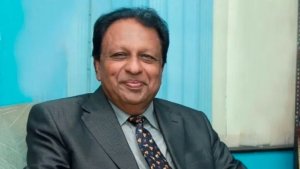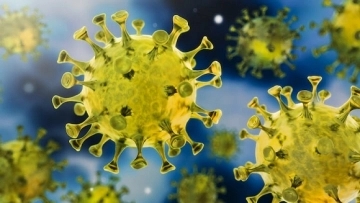
Not the End of the World
Though it may appear so, the present global pandemic is not going to be the end of the world, but it may mark the end of the world as we have known it so far. We faced a similar situation on 9/11 not because of the loss of life and potential danger to human life, but because the whole concept of national and global security underwent a transformation. The most powerful nations of the world realized that their military might would not guarantee their security. A few individuals, armed with nothing but knives and forks, were able to terrorize the world and the concepts of deterrent and Mutually Assured Destruction (MAD) became obsolete. The world has now settled down to a new norm and 9/11 today is just a nightmare. The same will happen in the case of Covid-19, regardless of the number of deaths that may take place around the world.
Not surprisingly, think tanks and strategic thinkers have begun to visualize the post-Covid-19 world. What they do not seem to realize is that the immediate need is not to visualize the future, but to deal with the pandemic. After all, the new world will depend on who will survive the disease. We should focus attention on controlling the spread and let the virologists, health workers and vaccine and medicine researchers do their work. The financial and market experts should make sure that sufficient resources are available for these activities and for preventing famines and hardship for the people. There will be plenty of time to speculate on the shape of the world of the future.
In any event, speculations and long- term plans have failed us at different stages of history. Nostradamus and astrologers appeared more reliable than futurologists on the fall of the Berlin Wall, Tiananmen Square and 9/11. At the recent Davos Forum consisting of the world’s political and economic thinkers thought that the biggest danger to the world would arise from creation of “useless humans” on account of the mastery of the machines. Today, this is not a concern. In fact, we are looking forward to AI, robotics and other marvels of technology to help us fight the pandemic. We should deal with the challenges of the times, but not of the uncertain future. The head of the WHO provided an excellent guide to save our physical and mental health at the time of COVID-19.
I suspect that the international and regional organizations have failed to respond to the pandemic adequately. The first international effort came from Prime Minister Narendra Modi, who organized a virtual SAARC summit, without bothering about its chairmanship and all the members attended. Pakistan, of course, showed its meanness by not attending at the highest level and raising the Kashmir issue. It spurned an opportunity to revive SAARC. India’s pledge of USD 10 million to the SAARC Fund to fight Covid-19 was not large, but significant. It was again PM Modi’s idea to convene a G-20 video conference, which the King of Saudi Arabia accepted and conducted. The very fact that the leading countries of the world decided to work together at this time had its own importance. The powerful G-7 too met, but the US-China spat inhibited any serious discussion or decisions as far as we know.
The United Nations has been the greatest disappointment. Reminding us of Shakespeare’ words, “when sorrows come, they come not single spies, but in battalions”, China is the President of the UN Security Council for the crucial month of March 2020. By now the Security Council should have met in an emergency session, by video conference, to coordinate the battle against COVID-19. The President of the Council has been blocking such a move because the responsibility of China for this mammoth tragedy will come up for discussion. He may be saying that COVID-19 is not on the Security Council agenda as its mandate is only peace and international security. Has there ever been a greater case of a grave threat to international security than this pandemic ever since the formation of the United Nations? How can the Chinese representative hold the Council to ransom because of his narrow national interests? But the Security Council is paralysed and it has lost its voice.
The World Health Organisation (WHO) appeared very guarded and hesitant in the beginning of the crisis, but soon woke up to do its professional job by gradually accepting COVID-19 as a pandemic and giving direction to the world how to deal with it. The Director General, Dr.Tedros Adhanom, an Ethiopian politician, who was Ethiopia’s former Health Minister and Foreign Minister, who was elected in 2017 for a five year term, did a splendid job, but he seemed lonely at the top of the WHO, battling a global pandemic. Being the first non-doctor Director General from a small African country, he seemed to have no support of the bigwigs in the UN system. COVID-19 is reputed to have been a leveller, but the hierarchy of power seemed to persist.
The UN Secretary General, Dr.Antonio Guterres, who is considered “the conscience of mankind” has been voicing his concerns and calling for a ceasefire in all conflicts in the face of the greatest threat to humanity. He also called for rolling back international sanctions regimes around the world, saying they are heightening the health risks for millions of people and weakening the global effort to contain the spread of the new coronavirus. It came as China and Russia, which are subject to U.S. and European sanctions for its invasion of Crimea, have also stepped up calls for an easing of sanctions. “I am encouraging the waiving of sanctions imposed on countries to ensure access to food, essential health supplies, and COVID-19 medical support. This is the time for solidarity not exclusion,” Guterres wrote in a letter to the G-20 economic powers. “Let us remember that we are only as strong as the weakest health system in our interconnected world.”
But the appeals are unlikely, however, to gain traction in the U.N. Security Council, where diplomats say there has been little serious thought given to the prospect of easing sanctions. Asked if there was growing opposition to the sanctions, one senior diplomat said, “No, not at all. The Russians and the Chinese are being cynically political and opportunistic.” “I would say there is no serious, coordinated response being considered in the U.N. about sanctions,” said one diplomat. I remember my own experience of being the Chairman of the Article 50 Committee of the Security Council in 1992. Though there is a clear provision in the Charter to compensate unintended victims of economic sanctions, nobody took the responsibility seriously.
As of today, multilateralism and regionalism are the first casualties of the pandemic. Apart from the paralysis of the UN, the European Union, seven decades in the making, appears to be falling apart. Faced with an existential threat, EU member states, far from joining together to confront the pandemic as a unified bloc, instinctively are returning to pursuing the national interest. After years of criticizing U.S. President Donald J. Trump for pushing an "America First" policy, European leaders are reverting to the very nationalism they disapproved of. In recent weeks, EU member states have closed their borders, banned exports of critical supplies and withheld humanitarian aid. The member states worst affected by the pandemic — Italy and Spain — have been left by the other member states to fend for themselves. But in the most recent briefing by the Secretary General, he not only outlined the measures the UN was taking, but also said: “Today’s threats-from COVID to Climate Change- are global and must be addressed through multilateral cooperation.”
Such cynicism and opportunism do not seem to be fading precisely because they know that this is not the end of the world. The nations are ready to battle it again after the pandemic recedes. It may be a different world altogether, but human greed is endless and everyone wants to devour the world.
The views and facts expressed in the article are that of the author

